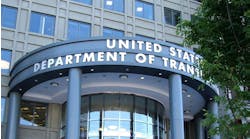Trucks equipped with speed governors have a 50% lower crash rate than trucks not equipped with speed control devices, according to the results of the second phase of a study conducted by the Federal Motor Carrier Safety Administration on the impact of the use of speed limiting devices in commercial vehicles.
“Results from multiple analyses indicated a profound safety benefit for trucks equipped with an active speed limiter,” the FMCSA report states.
The study represents the most comprehensive investigation that has ever been conducted on speed limiters (SL), according to FMCSA. The study included data from 20 truck fleets, approximately 138,000 trucks and analyzed more than 15,000 crashes. The findings showed “strong positive benefits for speed governors.” Results indicated that trucks equipped with speed limiters had a “significantly lower SL-relevant crash rate (approximately 50%) compared to trucks without SLs,” the study found.
Exceeding the speed limit or driving too fast for conditions was a contributing factor in 8% of all reported large truck crashes in 2009, according to the National Highway Traffic Safety Administration. According to the FMCSA Large Truck Crash Causation study, 22.9% of all large truck crashes and 10.4% of large truck/passenger car crashes were coded as “traveling too fast for conditions.”
The primary safety analysis in the study focused on the reduction in truck crashes that could have been avoided and/or mitigated with an active speed limiter installed. This was the first study to use actual truck crash data collected directly from truck fleets, representing a wide array of crashes, FMCSA said.
The study also concludes that the cost of speed limiter technology is negligible as it is a standard feature on new trucks (owners only need to activate and set the SL). “SLs are standard equipment on new trucks and have been used for some time, with the core technology built into the Engine Control Module (ECM). Historical problems related to driver tampering have been alleviated by the current electronic systems. Because the SL capability is standard, the cost to implement SLs is negligible, although some additional costs do accrue for fleets that use external maintenance centers to change SL settings,” the report stated.
Opponents of speed governors argue that safety can be compromised since speed-limited vehicles cannot accelerate to avoid traffic conflicts (for instance, in merging situations), and the slower speed of these vehicles relative to the surrounding traffic creates speed differentials. Studies have shown there can be an increased risk of crashes when speeds of vehicles traveling on the same highway are different.
“Domain research on the potential downside of speed deviations among vehicles that could occur due to the interaction of SL-equipped vehicles and those without SLs seems to be far outweighed by the significant safety benefits associated with a reduction in absolute speed afforded by SLs,” the study concluded. “The positive findings in this study were consistent with the bulk of the literature on this topic indicating significant safety benefits associated with speed reduction which can be achieved through the implementation of SLs.”



